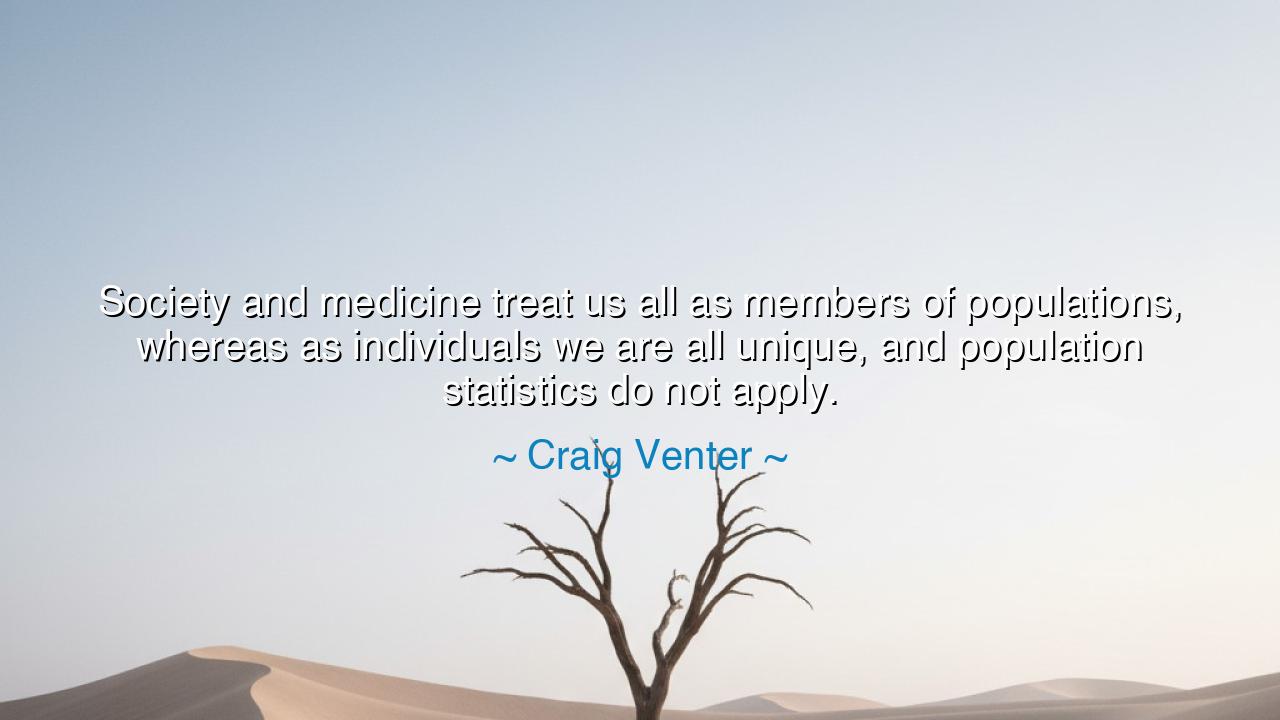
Society and medicine treat us all as members of populations
Society and medicine treat us all as members of populations, whereas as individuals we are all unique, and population statistics do not apply.






Craig Venter, the pioneer who first read the language of life itself through the sequencing of the human genome, once declared: “Society and medicine treat us all as members of populations, whereas as individuals we are all unique, and population statistics do not apply.” In these words is not only the voice of a scientist but the cry of a sage, reminding us that beneath the averages and generalizations, each human being is a singular miracle, unlike any other who has ever walked the earth.
The meaning is both profound and simple: though medicine often studies mankind in groups, through trials, patterns, and numbers, no single life is ever identical to the curve of the many. What applies to the population may not apply to the individual. And though society is quick to place us in categories—age, race, gender, class—each of us carries a story that refuses to be reduced. Venter, the man who read our genetic code, knew best of all that even in our shared humanity, the sequences of our DNA sing in unrepeatable variation. To forget this uniqueness is to dishonor the human spirit.
History gives us luminous examples. Consider the case of Ignaz Semmelweis, the 19th-century physician who noticed that mothers in hospitals were dying of childbed fever at much higher rates when attended by doctors who came directly from the dissecting room. The statistics of the time did not reveal the cause, nor did the accepted wisdom. Yet Semmelweis, by observing the individuals, realized that handwashing was the key. Society mocked him, clinging to averages and tradition, but he was right. Here lies Venter’s warning: when we reduce human lives to population statistics, we risk overlooking the truth that appears only when we treat people as singular souls.
Think also of the tragedies of eugenics, when governments and scientists in the early twentieth century justified sterilizations and exclusions on the basis of population averages. They sought to “improve” the whole by ignoring the dignity of the individual. In this darkness we see the danger of forgetting Venter’s wisdom: that every human being, no matter what measures or categories suggest, is an irreplaceable being whose worth cannot be captured by numbers. Statistics are tools, but they are not truth.
Yet Venter’s words are not only a caution—they are a path forward. In an age of genomic medicine, of personalized therapies, of >population, but to the unique individual. To see each person as distinct is not only philosophy but the future of care. What the ancients knew in their hearts—that each soul is unrepeatable—science now confirms with the map of the genome. The union of wisdom and discovery is here before us.
The lesson for us is mighty and humbling: never assume that what is true of the many is true of the one. Do not dismiss the singular because of the general. Whether in medicine, in judgment, or in daily life, honor the uniqueness of each human being. When we see others not as faceless members of a crowd, but as individuals with their own struggles and gifts, compassion deepens, justice strengthens, and truth is served.
Practical action flows from this teaching. Doctors, see your patients not as cases, but as people whose lives cannot be fully written by a chart. Citizens, resist the temptation to stereotype, for no label contains the fullness of a soul. Parents, teachers, leaders—recognize that the child or follower before you is not the sum of averages but a mystery, waiting to be seen, heard, and understood. Treat each life as sacred, each voice as unique, and in so doing, you give honor to the truth Venter revealed.
So let his words resound: society and medicine may group us into populations, but the eternal truth is that each of us is unique. Numbers may guide, but they must never rule over the dignity of the individual. Remember this always, and you will walk the path of wisdom—seeing not the mass, but the person; not the average, but the irreplaceable soul.






AAdministratorAdministrator
Welcome, honored guests. Please leave a comment, we will respond soon